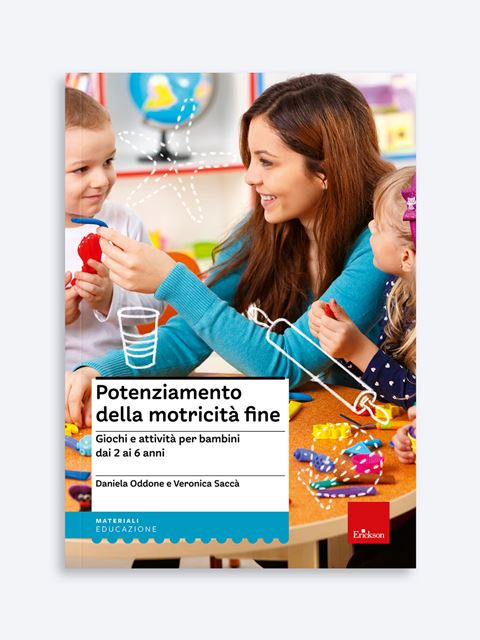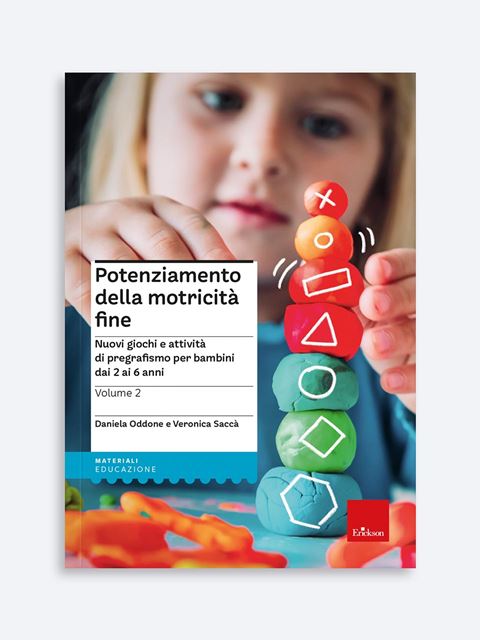 EN
EN
 PT
PT
Games and activities for children from ages 2 to 6
Product: Book
ISBN: 9788859017837
Publication date: 01/01/2019
Suitable for: Nursery 1st Level (ages 3-4), Nursery 2nd Level (ages 4-5)
REQUEST A SAMPLE OR MORE INFORMATION
 Rights sold to:
Bulgaria, Czech Republic
Rights sold to:
Bulgaria, Czech Republic
Fine motor skills are at the basis of the actions we perform every day, such as getting dressed, tying shoes, writing, etc., and should therefore be favored and reinforced from early childhood, to better accompany the growth of each child. This is the purpose of this book, which proposes games and activities to be carried out with DIY materials, aimed at improving accuracy, manual skills and hand-eye coordination, as well as fostering creativity, attentional skills, creativity and imagination. Preceded by a brief theoretical framework, the book is divided into three sections, one for each age group of psychomotor development:
Equipped with more than 20 full-colour worksheets and materials, including a board for an original board game, Improving Fine Motor Skills is a valuable tool for parents, educators, kindergarten teachers, practitioners and therapists working with children with learning difficulties and can be used both at home and in education and rehabilitation.
Introduction
The development of motor skills in the child
Bibliography
SECTION 1 – 2-3 years
SECTION 2 – 3-4 years
SECTION 3 – 5-6 years
WORKSHEETS
APPENDIX Instructions for the preparation of the materials

Games and activities for children from ages 2 to 6

As Piaget claims, movement plays a fundamental role in an individual’s development. The development of motricity takes place immediately after birth and continues gradually in well-defined stages, leading the child to perform increasingly complex and precise movements. In fact, through movement, children learn about the environment around them, developing spatial and temporal coordination and their cognitive abilities.
The two volumes of Improving Fine Motor Skills offer activities and games, to be carried out with DIY materials, aimed at improving precision and hand-eye coordination, enhancing fine motor skills and promoting the correct development of some of the motor prerequisites necessary for learning to write, as well as fostering creativity, attention skills, and imagination.
Objectives
The development of fine motor skill s a process that is not always represented by linear progress. Sometimes it is faster, sometimes slower, depending on the individual. This book can be a valuable tool for nursery school teachers, parents, educators and therapists to offer and stimulate the carrying out of daily actions, accompanying the child in his/her personal growth progress through games.
The volumes in the series
The volumes propose different activities grouped into 3 sections, one for each age group of psychomotor development (2-3 years, 3-4 years, 5-6 years). The materials used are readily available, and natural and daily actions are suggested to the child.
Each book includes:


Improving Fine Motor Skills – Volume 1
The book features games and activities to improve accuracy, manual skills and hand-eye coordination.

Daily actions, such as threading, unscrewing, screwing, shaping, coloring, cutting and activities are divided into three sections:
SECTION 1 (from 2 to 3 years): activities to encourage coordination, increase attention, visual tracking and dexterity (dimensional concepts, associating images and colours, using symbols).
SECTION 2 (from 3 to 4 years): activities to improve the specific coordination skill of control and regulation of arm and hand movements.
SECTION 3 (from 5 to 6 years): activities aimed at the development of the fine motor skill prerequisites necessary for learning to write (individual finger movements, correct positioning, managing the space of a piece of paper).
Leaf through some pages of the book which have been translated into English to facilitate your evaluation of the product.
Improving Fine Motor Skills – Volume 2

The book offers games and activities to enhance fine motor skills and promote the correct development of some of the motor prerequisites necessary for learning to write. The activities are divided into three sections:
SECTION 1 (from 2 to 3 years):hand-eye coordination, attention, dexterity, knowledge of dimensional concepts, colors, shifts, etc;
SECTION 2 (from 3 to 4 years): the regulation of upper limb and hand movements, fine motor skills and finger movements;
SECTION 3 (from 5 to 6 years): fine motor skill development, including correct grasp and grip, concentration, as well as posture.
Leaf through some pages of the book which have been translated into English to facilitate your evaluation of the product.
The Authors
Daniela Oddone She has a degree in Neuro Therapy and Developmental Psychomotricity at the University of Pisa, and currently works in Genoa at a private affiliated center specializing in the treatment of developmental disorders.
Veronica Saccà She graduated from Neuro Therapy and Developmental Psychomotricity at the University of Messina, and works as a Third Party Operator, Educator of the graphic gesture AED (European Disgraphies Association) and an AIMI Infant Massage teacher. She deals with evaluation and neuropsychomotor treatment for children with developmental disorders.